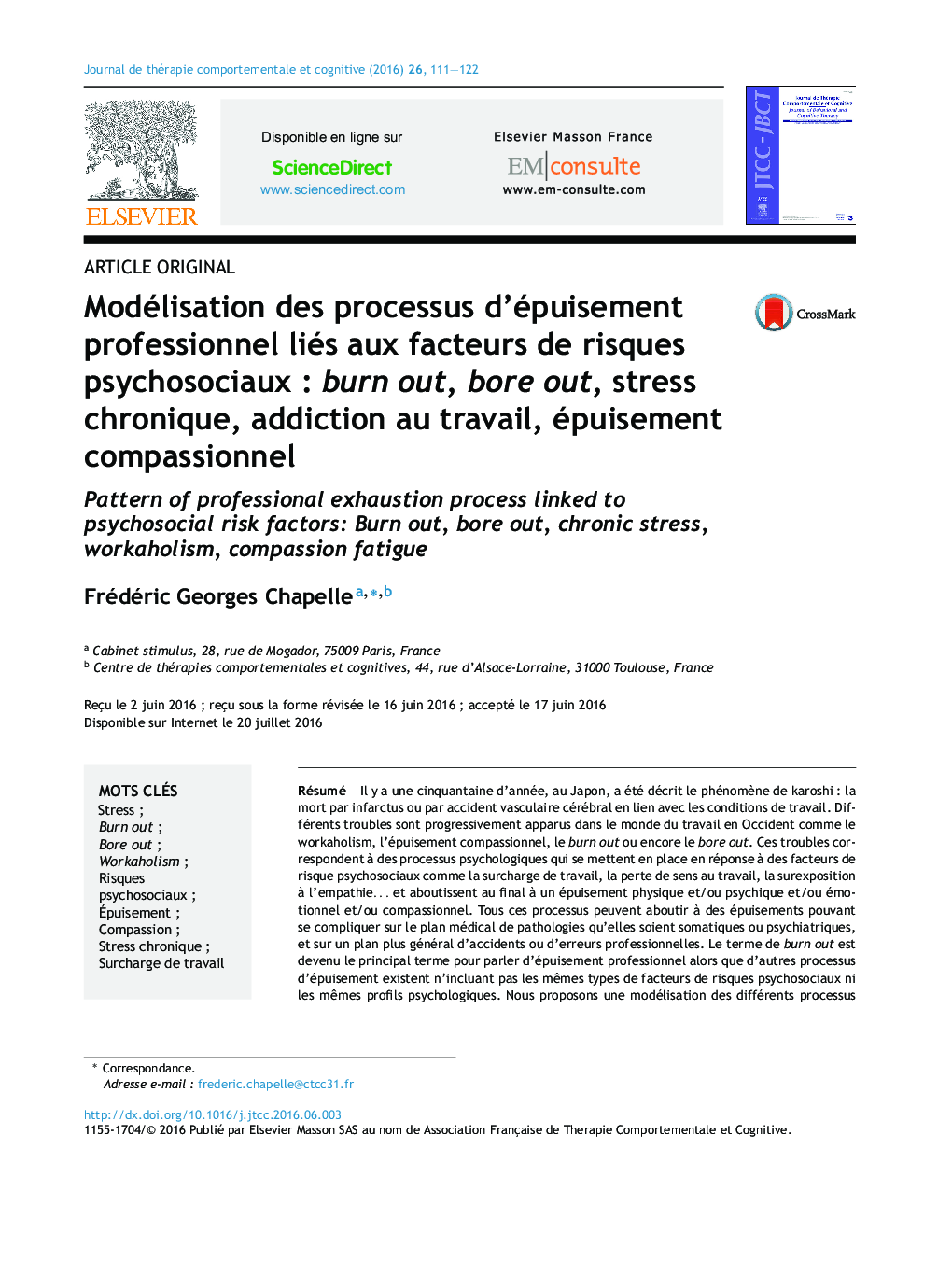| کد مقاله | کد نشریه | سال انتشار | مقاله انگلیسی | نسخه تمام متن |
|---|---|---|---|---|
| 5042854 | 1370542 | 2016 | 12 صفحه PDF | دانلود رایگان |
عنوان انگلیسی مقاله ISI
Modélisation des processus d'épuisement professionnel liés aux facteurs de risques psychosociaux : burn out, bore out, stress chronique, addiction au travail, épuisement compassionnel
دانلود مقاله + سفارش ترجمه
دانلود مقاله ISI انگلیسی
رایگان برای ایرانیان
کلمات کلیدی
موضوعات مرتبط
علوم پزشکی و سلامت
پزشکی و دندانپزشکی
روانپزشکی و بهداشت روانی
پیش نمایش صفحه اول مقاله

چکیده انگلیسی
The karoshi phenomenon was first described around fifty years ago in Japan: death by heart attack or stroke linked to working conditions (Uehata, 1991). Various disorders such as workaholism, compassion fatigue, burn out and bore out, have progressively appeared in the western workplace. These disorders correspond to psychological processes set up in response to psychosocial risk (PSR) factors such as overwork, loss of motivation, overexposure to empathy⦠and result in physical and/or psychic and/or emotional and/or compassion exhaustion. The term “burn out” has become the most common term to talk about professional exhaustion although there are other exhaustion processes which do not include the same types of PSR factors or the same psychological profiles. Overwork is the dominant PSR factor in burn out, while boredom is the main factor in bore out, and excess of empathy or compassion leads to compassion fatigue (Zawieja, 2015). Psychologically, there are differences, for example, the process of burn out describes those displaying excessive commitment to work, while workaholism concerns obsessionality. All of these differences point to the need to reconsider exhaustion processes and not just stop at the process of burn out. Burn out was initially described by Freudenberger (1974) in relation to a specific population and zeitgeist, and should not be confused with other exhaustion processes. In the same way, workaholism described by Oates (1968, 1971) referred to the observation of a process of addiction to work. Recent descriptions have moved away from this description. Rather than wishing to include all employees in categories described for precise conditions and populations, it would be more appropriate to precisely determine the PSR factors at play, as well as the psychological profiles most likely to be affected. We suggest a model of different processes of professional exhaustion with their own particularities and proximities. According to the type of PSR factor and specific personality elements, we are able to establish different exhaustion processes. This model includes burn out, compassion fatigue which can evolve into a type of burn out, bore out, chronic stress and workaholism. All of these processes can lead to physical and/or psychic and/or emotional and/or compassion exhaustion. This exhaustion can evolve secondarily towards somatic or psychiatric pathologies, and can also be responsible for professional errors or accidents. These distinctions seem essential as treatment requires knowledge of both PSR factors, which must be identified in order to be modified (in terms of workload organisation), and also psychological profiles (and possible cognitive schemas), which require a specific approach. There are few studies on the psychotherapeutic treatment of professional exhaustion. However, cognitive-behavioural therapies seem to be the most efficient, particularly in the case of burn out (Korczak, 2012). Acceptance and commitment therapy supports psychological flexibility lacking in the patient in the case of burn out, and meditation is particularly useful in the treatment of compassion fatigue. Independent of the actual exhaustion process, prevention must take place at the primary stage to avoid development, at the secondary stage to prevent its amplification, and at the tertiary stage when the disorder is evident to avoid deterioration and relapse. Quaternary prevention is committed to correctly identifying the process in order to avoid over-psychologisation (Zawieja, 2015).
ناشر
Database: Elsevier - ScienceDirect (ساینس دایرکت)
Journal: Journal de Thérapie Comportementale et Cognitive - Volume 26, Issue 3, September 2016, Pages 111-122
Journal: Journal de Thérapie Comportementale et Cognitive - Volume 26, Issue 3, September 2016, Pages 111-122
نویسندگان
Frédéric Georges Chapelle,